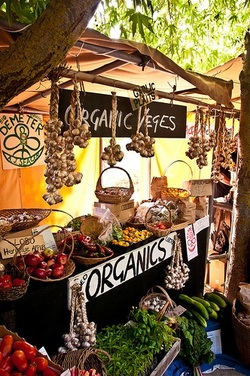
-Organics-
The organic industry is growing by leaps and bounds, which is a positive sign that our society is understanding that in order to be healthy, we must eat healthy. Organic food may still contain some chemical residues (from wash off from other farms, through the air), but if authentic, organic food will have less chemicals piece for piece. The Environmental Working group out of Washington came up with a list of the "Dirty Dozen" for produce for items that should be purchased organic, due to the high chemical content in regular produce.
Most Contaminated Least Contaminated according the Environmental Working Group:
Apples Asparagus Bell Peppers Avocado Celery Bananas Cherries Broccoli Imported grapes Cauliflower Nectarines
Sweet Corn Peaches Kiwi Pears Mangoes Potatoes Onions Red raspberries Papaya Spinach Pineapple Strawberries Sweet Peas
If you are unable to buy organic due to availability or cost, mix up your produce choices so you are not being exposed to the same herbicide/pesticide residues.
Wash your produce with water. People can go over the top with attempting to clean produce. There are many products available to wash produce, but they are most likely unnecessary. Rinsing produce well with cold water should be sufficient. Another option is vinegar and water - which you can scrub or soak produce in.
Organic Tips:
The organic industry is growing by leaps and bounds, which is a positive sign that our society is understanding that in order to be healthy, we must eat healthy. Organic food may still contain some chemical residues (from wash off from other farms, through the air), but if authentic, organic food will have less chemicals piece for piece. The Environmental Working group out of Washington came up with a list of the "Dirty Dozen" for produce for items that should be purchased organic, due to the high chemical content in regular produce.
Most Contaminated Least Contaminated according the Environmental Working Group:
Apples Asparagus Bell Peppers Avocado Celery Bananas Cherries Broccoli Imported grapes Cauliflower Nectarines
Sweet Corn Peaches Kiwi Pears Mangoes Potatoes Onions Red raspberries Papaya Spinach Pineapple Strawberries Sweet Peas
If you are unable to buy organic due to availability or cost, mix up your produce choices so you are not being exposed to the same herbicide/pesticide residues.
Wash your produce with water. People can go over the top with attempting to clean produce. There are many products available to wash produce, but they are most likely unnecessary. Rinsing produce well with cold water should be sufficient. Another option is vinegar and water - which you can scrub or soak produce in.
Organic Tips:
- If you are a coffee drinker, try organic coffee. You will experience richer taste and eliminate numerous herbicides and pesticides that are present in regular coffee.
- Try to add at least one organic product each time you shop. Include spices, snacks, and items used for baking to stock up your pantry.
- If you have a favorite junk food that you are not willing to give up, buy it organic to eliminate the numerous additives and preservatives that are found in processed foods.
- Not all organic foods are created equal. You will still need to read labels.
- Try organic eggs. The shells are thicker and they have a noticeable taste difference.
- Organic carrots are generally reasonably priced, are great for the eyes (they generally have 200% of he daily requirements for Vitamin A) and they taste great for a snack or as part of a meal.
